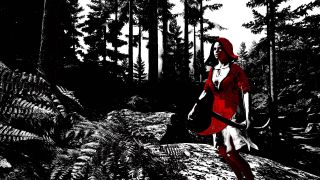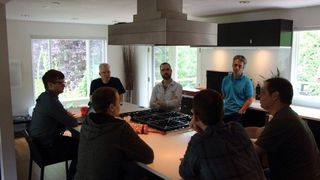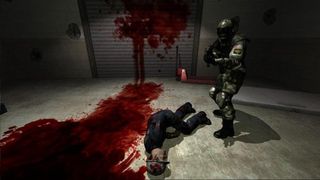How F.E.A.R. and No One Lives Forever are shaping Betrayer

Earlier this week we announced Betrayer , a self-funded indie FPS from veteran ex-Monolith personnel who have formed their own studio, Blackpowder Games . Betrayer is unique—a 15th-century atmospheric shooter set in colonial Virginia—but I wanted to hear firsthand how Blackpowder's collective decades of experience on other, more action-focused franchises is informing its work on the game.
I spoke with asked the game's creative lead and writer, Craig Hubbard.

"If you look at F.E.A.R. as the outcome of NOLF 2, you can really see our trajectory."
PCG: How are F.E.A.R. and No One Lives Forever informing your work on Betrayer?
Craig Hubbard: One of the things I think we've always really enjoyed about development is applying the things that we learned from the previous project. And so… If you look at F.E.A.R. as the outcome of NOLF 2, you can really see our trajectory. Every game is almost a pendulum swing. NOLF 2, there were a lot of things we really enjoyed, but also a lot of things that were frustrating. So F.E.A.R. was almost like stripping a lot of the complexity away and just trying to get to the point. The one thing about NOLF that really frustrated me at the end of NOLF 2 is that the combat just didn't feel that solid. We really wanted to get that right. We were switching to a new engine and we had a new team, so we had to just pull everything out and focus on that and spend a lot of time on it. It ended up being the primary focus of the game. There's something about that process that was really satisfying in spite of a lot of the challenges we had on that project. We really tried, on this, to focus on making running around and shooting feel as good as we could with a small group like this. I think that comes directly from F.E.A.R. Because even in F.E.A.R., the weapons didn't feel as solid as we wanted them to. Little things like that. I think all of it feeds into this. You can see all those lessons from previous games that we've worked on.
We recently named the HV Penetrator our third-favorite gun of all time .
With that, you can draw the line all the way back to Shogo . On Shogo, we were… I'd say we were about six months from the end. We had this super ambitious plan. We didn't know what we were doing. We just had this pie-in-the-sky dream of what the game was going to be. Then we realized, “We have to ship in six months. There is no way we're going to do this. This game is not going to be great. But we can still make it fun.” So we just put all our energy in making the weapons really fun to use. I think that has been something we've tried to do. Each game like NOLF, trying to get the harpoon gun and the Corrector , having at least a couple of weapons that feel really satisfying to use has always been a big focus for us.

What's your approach to making a game scary? Betrayer isn't F.E.A.R., which is more explicitly a horror game in my eyes, but I'm curious how you differentiate them.
PC Gamer Newsletter
Sign up to get the best content of the week, and great gaming deals, as picked by the editors.
It's actually very similar. The thing with F.E.A.R. is that we didn't actually come up with the name. We didn't want to have a name that evoked horror. We wanted to have a name that evoked action, so that the horror would feel like this unexpected seasoning in the mix. It ended up being called F.E.A.R. and so you automatically go into it expecting to be scared. If you're not into that type of horror, you're going to be disappointed. So I think it's a very similar type of observational, more atmospheric style than straight-up horror. As you play the game and see more of it, there are some thematic elements that are familiar from F.E.A.R. This is kind of almost iterating on it and trying to make it better and more satisfying. It's certainly not an explicit horror game at all.
"The more unexpected you can get with the sounds, the better."
In Betrayer you're using sound as a primary navigation element. What's your approach to sound design, past and present?
I think the fundamental thing is, you want to get the atmosphere feeling immersive. You want the core mechanics of shooting guns to feel satisfying. There's still a lot of missing cues and stuff that needs to be iterated on, but… That's the key. Personally I feel like the more unexpected you can get with the sounds, the better. One of my favorite things that we ever did is on NOLF. One of the early levels, you're sniping out a window. We were looking for an ambient sound cue and we found this sound of a market somewhere in the Middle East and somebody hammering. Just putting that in there instantly brought the place to life in a way that no other more traditional approach would have done. Just because it's unexpected. It feels kind of mundane. This is obviously a different thing where we don't have people hammering and stuff like that, but we still want to try and surprise you a little bit with what you're hearing and how it meshes with your expectations, or hopefully doesn't mesh with your expectations.
Thanks, Craig.
Check back next week for more of our conversation with Blackpowder Games .

Evan's a hardcore FPS enthusiast who joined PC Gamer in 2008. After an era spent publishing reviews, news, and cover features, he now oversees editorial operations for PC Gamer worldwide, including setting policy, training, and editing stories written by the wider team. His most-played FPSes are CS:GO, Team Fortress 2, Team Fortress Classic, Rainbow Six Siege, and Arma 2. His first multiplayer FPS was Quake 2, played on serial LAN in his uncle's basement, the ideal conditions for instilling a lifelong fondness for fragging. Evan also leads production of the PC Gaming Show, the annual E3 showcase event dedicated to PC gaming.
Most Popular





